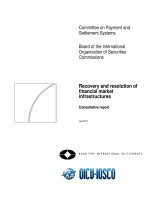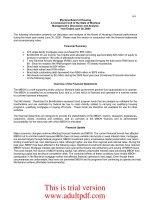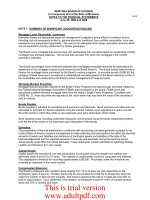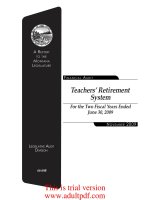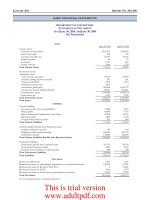Solicitation No. CB07-RFP0003 Full and Open Competition Financial Audit Services_part5 doc
Bạn đang xem bản rút gọn của tài liệu. Xem và tải ngay bản đầy đủ của tài liệu tại đây (39.84 KB, 9 trang )
CB07-RFP0003 Financial Audit Services PAGE 35
(2) Mark each sheet of data it wishes to restrict with the following legend:
“Use or disclosure of data contained on this sheet is subject to the restriction on the title
page of this proposal.”
(f) Contract award.
(1) The government intends to award a contract or contracts resulting from this
solicitation to the responsible offeror(s) whose proposal(s) represents the best value after
evaluation in accordance with the factors and subfactors in the solicitation.
(2) The government may reject any or all proposals if such action is in the
government’s interest.
(3) The government may waive informalities and minor irregularities in proposals
received.
(4) The government intends to evaluate proposals and award a contract without
discussions with offerors (except clarifications as described in FAR 15.306(a)).
Therefore, the offeror’s initial proposal should contain the offeror’s best terms from a
cost or price and technical standpoint. The government reserves the right to conduct
discussions if the Contracting Officer later determines them to be necessary. If the
Contracting Officer determines that the number of proposals that would otherwise be in
the competitive range exceeds the number at which an efficient competition can be
conducted, the Contracting Officer may limit the number of proposals in the competitive
range to the greatest number that will permit an efficient competition among the most
highly rated proposals.
(5) The government reserves the right to make an award on any item for a quantity
less than the quantity offered, at the unit cost or prices offered, unless the offeror
specifies otherwise in the proposal.
(6) The government reserves the right to make multiple awards if, after considering
the additional administrative costs, it is in the government’s best interest to do so.
(7) Exchanges with offerors after receipt of a proposal do not constitute a rejection or
counteroffer by the government.
(8) The government may determine that a proposal is unacceptable if the prices
proposed are materially unbalanced between line items or subline items. Unbalanced
pricing exists when, despite an acceptable total evaluated price, the price of one or more
contract line items is significantly overstated or understated as indicated by the
application of cost or price analysis techniques. A proposal may be rejected if the
Contracting Officer determines that the lack of balance poses an unacceptable risk to the
government.
This is trial version
www.adultpdf.com
CB07-RFP0003 Financial Audit Services PAGE 36
(9) If a cost realism analysis is performed, cost realism may be considered by the
source selection authority in evaluating performance or schedule risk.
(10) A written award or acceptance of proposal mailed or otherwise furnished to the
successful offeror within the time specified in the proposal shall result in a binding
contract without further action by either party.
(11) If a post-award debriefing is given to requesting offerors, the government shall
disclose the following information, if applicable:
(i) The agency’s evaluation of the significant weak or deficient factors in the
debriefed offeror’s offer.
(ii) The overall evaluated cost or price and technical rating of the successful
and the debriefed offeror and past performance information on the debriefed
offeror.
(iii) The overall ranking of all offerors, when any ranking was developed by
the agency during source selection.
(iv) A summary of the rationale for award.
(v) For acquisitions of commercial items, the make and model of the item to
be delivered by the successful offeror.
(vi) Reasonable responses to relevant questions posed by the debriefed offeror
as to whether source-selection procedures set forth in the solicitation, applicable
regulations, and other applicable authorities were followed by the agency.
CBO 28 ELECTRONIC MAIL AND FACSIMILE PROPOSALS (FEB 2007)
(a) Definitions.
“Electronic Mail (email) proposal,” as used in this provision, means a proposal, revision or
modification of a proposal, or withdrawal of a proposal that is transmitted to and received by the
Government via Internet electronic mail.
“Facsimile proposal,” as used in this provision, means a proposal, revision or modification of a
proposal, or withdrawal of a proposal that is transmitted to and received by the Government via
facsimile machine.
(b) Offerors may submit email or facsimile proposals as responses to this solicitation. Email
and facsimile proposals are subject to the same rules as paper proposals.
(c) (1) The email address for receiving proposals is:
(2) The telephone number of receiving facsimile equipment is: (888) 734-1760.
(d) If any portion of an email or facsimile proposal received by the Contracting Officer is
unreadable to the degree that conformance to the essential requirements of the solicitation cannot
be ascertained from the document—
This is trial version
www.adultpdf.com
CB07-RFP0003 Financial Audit Services PAGE 37
(1) The Contracting Officer immediately shall notify the offeror and permit the
offeror to resubmit the proposal;
(2) The method and time for resubmission shall be prescribed by the Contracting
Officer after consultation with the offeror; and
(3) The resubmission shall be considered as if it were received at the date and time of
the original unreadable submission for the purpose of determining timeliness,
provided the offeror complies with the time and format requirements for
resubmission prescribed by the Contracting Officer.
(e) The Government reserves the right to make award solely on the email or facsimile
proposal. However, if requested to do so by the Contracting Officer, the apparently successful
offeror promptly shall submit the complete original signed proposal.
L.3 TYPE OF CONTRACT (APR 1984)
The government contemplates award of a firm fixed-price contract resulting from this
solicitation.
L.4 PROPOSAL COMPOSITION – SOURCE SELECTION PROCEDURES
(a) Proposals shall be submitted in two separate volumes or files: (1) A Technical Proposal
which content and arrangement shall be as described in the Section L provision entitled,
“Instructions for Preparing the Technical Proposal,” and (2) a Price Proposal, which shall be
prepared in detail on a basis as described and set forth in the Section L provision entitled,
“Instructions for Preparing the Price Proposal.”
(b) Each offeror may submit one or more proposals; however, each proposal shall be
configured as described above, shall be considered on its own merits as to the completeness of
submission and shall not share required documentation or other requirements of submission with
any other proposal submitted by the same offeror.
L.5 INSTRUCTIONS FOR PREPARING THE TECHNICAL PROPOSAL
(a) The Technical Proposal shall effectively demonstrate a thorough understanding of the
Statement of Work contained in Section C of this solicitation, and demonstrate the offeror’s
ability to meet the project requirements and provide the deliverables described in the work
statement.
(b) Technical proposals should be practical, legible, clear, and coherent. General statements
that the offeror can comply with the requirements will not, by themselves, be adequate. Failure to
provide the technical information requested may be cause for rejection of the offer. To permit
objective evaluation of the technical proposal, NO COST OR PRICE INFORMATION SHALL
BE INCLUDED IN THE TECHNICAL PROPOSAL.
(c) Offers submitted by e-mail, in accordance with the provision at CBO 28, may be in any
of the following file formats:
(1) Adobe Acrobat PDF version 6 or later.
(2) Microsoft Word 2000 or later.
This is trial version
www.adultpdf.com
CB07-RFP0003 Financial Audit Services PAGE 38
(3) WordPerfect 10 or later.
(4) Microsoft Excel 2000 or later.
(d) The Technical Proposal shall be organized in accordance with the following format to
facilitate evaluation by the Congressional Budget Office.
(1) The Technical Proposal shall be subdivided into four subsections. The offeror
shall address each factor as noted below:
Factor 1 – Capability and Experience of the Contractor. The offeror must
describe its general background, experience and qualifications related to this
solicitation. The offeror must demonstrate that it has extensive experience in
performing similar or related work.
(i) Provide quality control program and the results of the last firm peer
review. (Provide a copy of the peer review report, letter of comments and
firm’s response; if the offeror has been inspected by the Public Companies
Accounting Oversight Board (PCAOB), please submit all PCAOB
inspection reports.)
(ii) Provide any other available information which indicates that the offeror
has the capability and/or experience necessary to perform the work
required by the solicitation.
Factor 2 – Qualifications of the Audit Team. The offeror must describe the
experience and qualifications of its proposed personnel. The offeror must
demonstrate that it has sufficient and qualified staff available to perform the work
required.
(i) Provide résumés of key personnel (key partners, managers, and senior
staff) proposed to perform the work with information summarizing their
experience with jobs of similar scope and size, including:
(A) auditing services experience of the type requested in this
solicitation;
(B) current position with the firm*/other experience;
(C) continuing education (including compliance with Yellow Book
requirements);
(D) professional accomplishments/certifications; and
(E) education.
(ii) Identify proposed audit teams (by name, if possible; by position
description otherwise) and amounts of experience as they relate to
performing audit tasks. Specify whether the experience is related to
government or private sector audits.
(iii) Identify training requirements for professional staff, especially in
government auditing, audit sampling, and use of computers.
This is trial version
www.adultpdf.com
CB07-RFP0003 Financial Audit Services PAGE 39
* All proposed personnel must currently hold the same, or higher,
position in the firm with regard to the position for which they are
being proposed under this solicitation.
Factor 3 – Technical and Managerial Approach to the Work. This factor
addresses the offeror’s proposed overall technical approach to perform the work
required by this solicitation, including but not limited to:
(i) Provide a work plan that addresses the proposed methods, techniques, and
schedule for performing the required audit tasks. Include a discussion of
any anticipated problems and solutions.
(ii) Describe the estimated number of employees (full- and part-time) and
their position descriptions (including general qualifications) who will be
performing the tasks.
Factor 4 – Past Performance. Although the Government reserves the right to use
any source of information available on the offeror’s past performance to either
evaluate past performance or verify information provided by the offeror, the
offeror shall provide information that demonstrates the offeror’s past
performance.
(i) The attachment entitled “CBO PAST PERFORMANCE
QUESTIONNAIRE” (Attachment 3 at Section J) shall be provided to
three (3) or more companies/agencies for whom the offeror recently
(completed within the last five years or ongoing) performed contracts,
similar in scope and magnitude to the work required under this
solicitation. The questionnaire(s) must be faxed by the
companies/agencies to the attention of Caryn Rotheim at (888) 734-1760
by the date established for receipt of offers in order to be considered in the
evaluation process. A neutral rating will be applied for those
projects/contracts for which a questionnaire or other reference information
is not received.
(A) The government may use other references/information to verify
past performance.
(B) The offeror may provide awards, letters or other documentation as
it relates to their Past Performance.
(C) The proposal shall list contact information (name and telephone
number, at a minimum) of all references to whom a questionnaire
was sent to assist CBO in tracking responses.
(D) The proposal shall identify past projects executed by the proposed
project team (or selected team members) and include references or
letters that describe the team’s performance.
(E) Corporate and/or government references are equally acceptable for
past performance.
This is trial version
www.adultpdf.com
CB07-RFP0003 Financial Audit Services PAGE 40
L.6 INSTRUCTIONS FOR PREPARING THE PRICE PROPOSAL – SOURCE
SELECTION PROCEDURES
(a) A lump sum price shall be entered by each offeror on the Schedule page for each line
item which shall represent the firm fixed price for performing the scope of services required by
this Request for Proposal. Offerors are hereby notified that even if cost or pricing data are not
initially requested in this solicitation, the Contracting Officer reserves the right to request such
data if they are later found necessary.
(b) The Price Proposal will be submitted with the required documents in the following order:
(1) A completed copy of Standard Form 33, “Solicitation, Offer and Award” from
Section A (signature required in Block 17).
(2) A fully completed “PRICE SCHEDULE” at paragraph B.2 of Section B, with
prices entered for all Schedule line items.
(3) A completed copy of the provision entitled “OFFEROR REPRESENTATIONS
AND CERTIFICATIONS” located at paragraph K.2 of Section K.
(c) Price Proposal Format.
(1) All price or cost amounts proposed shall be expressed to no more than two
decimal places.
(2) Offerors may submit their price proposal by fax or e-mail, in accordance with the
provision at CBO 28 and the following instructions:
(a) All spreadsheet documents provided electronically shall be provided using
Microsoft Excel 2000 or later.
(b) All word processing documents provided electronically shall be provided
using Adobe Acrobat PDF or Microsoft Word 2000 or later.
END OF SECTION L
This is trial version
www.adultpdf.com
CB07-RFP0003 Financial Audit Services PAGE 41
SECTION M
EVALUATION FACTORS FOR AWARD
M.1 PROPOSAL EVALUATION CRITERIA – SOURCE SELECTION
PROCEDURES
(a) The evaluation criteria to be used by the Contracting Officer for the selection of a
contractor to perform the work specified are defined below. The criteria are divided into
technical and price categories which consist of subsections corresponding to those in the Section
L provisions entitled “Instructions for Preparing the Technical Proposal” and “Instructions for
Preparing the Price Proposal.” The technical criteria are considered by CBO to be generally
more important than price criteria. However, as the difference in technical merit between the
proposals becomes less significant, the relative importance of the price will increase.
(b) TECHNICAL CRITERIA. Each offeror’s proposal will be evaluated in accordance with
the technical criteria listed below to determine the extent to which it addresses the requirements
of the RFP. Technical criteria are listed below in descending order of importance. Subfactors (if
applicable) are considered to be of equal importance within a factor.
Factor 1 – Capability and Experience of the Contractor
Factor 2 – Qualifications of the Audit Team
Factor 3 – Technical and Managerial Approach to the Work
Factor 4 – Past Performance
(1) Factor 1 – Capability and Experience of the Contractor: The offeror’s
experience will be evaluated to determine the extent and relevancy of similar projects performed
within the past five years. Experience auditing government agencies is highly desirable, as is
experience with agencies in the Legislative Branch.
(2) Factor 2 – Qualifications of the Audit Team: The offeror’s audit team’s
qualifications will be evaluated to determine the extent and relevancy of their education and
experience with similar projects. Experience auditing government agencies is highly desirable.
(3) Factor 3 – Technical and Managerial Approach to the Work: The offeror’s
proposed approach to the audit tasks will be evaluated to determine the extent to which it
understands the tasks necessary to successfully accomplish each item, the methods proposed for
approaching the tasks identified as necessary for accomplishing the objectives, and proposed
staffing (professional, technical, support, and contracted) needed to complete the identified tasks.
The information submitted for this factor should convincingly describe the capability of the
offeror’s organization to participate in this project and effectively demonstrate a thorough
understanding of the work statement contained in Section C of this solicitation.
(4) Factor 4 – Past Performance: The offeror’s relevant past performance will be
evaluated to determine the extent of successful completion of similar projects within the past five
years, taking into consideration timeliness and degree of client satisfaction for each project.
This is trial version
www.adultpdf.com
CB07-RFP0003 Financial Audit Services PAGE 42
Higher scores will be given to offerors whose past performance has exhibited the most success
on similar projects. In investigating the offeror’s past performance, the government will consider
references submitted by the offeror and may consider information from other sources.
By PAST PERFORMANCE, the government means the offeror’s record of conforming
to specifications and standards of good workmanship; the offeror’s adherence to contract
schedules, including the administrative aspects of performance; the offeror’s reputation for
reasonable and cooperative behavior and commitment to customer satisfaction; and generally,
the offeror’s business-like concern for the interest of the customer.
(b) PRICE CRITERIA. Offers will be evaluated based on the total proposed price for all
contract periods (base period and all option periods) using the Schedule in Section B of the
solicitation. Price will not be assigned an adjectival rating.
M.2 EVALUATION ADJECTIVAL RATINGS
This rating system identifies significant strengths, weaknesses, overall technical effectiveness
and risks associated with each proposal. Each factor or subfactor is rated and is to be supported
by narrative rationale.
(a) Outstanding: Very comprehensive, in-depth, clear response. The offeror has
demonstrated an approach which significantly exceeds stated requirements in a beneficial way.
Consistently high quality performance can be expected.
(b) Excellent: Extensive, detailed response to all requirements similar to outstanding in
quality, but with minor areas of unevenness or spottiness. High quality performance is likely but
not assured due to minor omissions or areas where less than high performance might be.
(c) Acceptable: The offeror has demonstrated an approach which is considered to meet the
stated requirements and demonstrated a good probability of success. There is an average risk that
this offeror would fail to meet the quantity, quality, and schedule requirements of the solicitation.
Weaknesses are not major.
(d) Neutral: Applies only to the Past Performance factor. This rating is applied when no
relevant past performance information is provided or available for an offeror or a provided
reference.
(e) Marginal: The offeror has demonstrated an approach which does not meet all the stated
requirements. The response is considered marginal in terms of the basic contract and amount of
information provided. There is a low probability of success. Although considered marginal
because of deficiencies, they are susceptible to being made acceptable through discussions.
(f) Unacceptable: The offeror has demonstrated an approach which significantly fails to
meet the stated requirements. What was submitted lacks essential information or is conflicting
and unproductive. There is no reasonable likelihood of success; deficiencies are so major or
extensive that a major revision to the proposal would be necessary.
This is trial version
www.adultpdf.com
CB07-RFP0003 Financial Audit Services PAGE 43
M.3 EVALUATION OF OPTIONS (JULY 1990)
Except when it is determined not to be in the government’s best interests, the government will
evaluate offers for award purposes by adding the total price for all options to the total price for
the basic requirement. Evaluation of options will not obligate the government to exercise the
option(s).
END OF SECTION M
This is trial version
www.adultpdf.com
